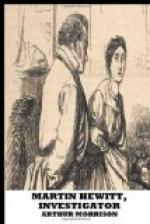“They couldn’t possibly be traced over properly in less than two or two and a half long days of very hard work,” Dixon replied with eagerness.
“Ah! then it is as I feared. These tracings have been photographed, Mr. Dixon, and our task is one of every possible difficulty. If they had been copied in the ordinary way, one might hope to get hold of the copy. But photography upsets everything. Copies can be multiplied with such amazing facility that, once the thief gets a decent start, it is almost hopeless to checkmate him. The only chance is to get at the negatives before copies are taken. I must act at once; and I fear, between ourselves, it may be necessary for me to step very distinctly over the line of the law in the matter. You see, to get at those negatives may involve something very like house-breaking. There must be no delay, no waiting for legal procedure, or the mischief is done. Indeed, I very much question whether you have any legal remedy, strictly speaking.”
“Mr. Hewitt, I implore you, do what you can. I need not say that all I have is at your disposal. I will guarantee to hold you harmless for anything that may happen. But do, I entreat you, do everything possible. Think of what the consequences may be!”
“Well, yes, so I do,” Hewitt remarked, with a smile. “The consequences to me, if I were charged with house-breaking, might be something that no amount of guarantee could mitigate. However, I will do what I can, if only from patriotic motives. Now, I must see your tracer, Ritter. He is the traitor in the camp.”
“Ritter? But how?”
“Never mind that now. You are upset and agitated, and had better not know more than is necessary for a little while, in case you say or do something unguarded. With Ritter I must take a deep course; what I don’t know I must appear to know, and that will seem more likely to him if I disclaim acquaintance with what I do know. But first put these tracings safely away out of sight.”
Dixon slipped them behind his book-case.
“Now,” Hewitt pursued, “call Mr. Worsfold and give him something to do that will keep him in the inner office across the way, and tell him to send Ritter here.”
Mr. Dixon called his chief draughtsman and requested him to put in order the drawings in the drawers of the inner room that had been disarranged by the search, and to send Ritter, as Hewitt had suggested.
Ritter walked into the private room with an air of respectful attention. He was a puffy-faced, unhealthy-looking young man, with very small eyes and a loose, mobile mouth.
“Sit down, Mr. Ritter,” Hewitt said, in a stern voice. “Your recent transactions with your friend Mr. Hunter are well known both to Mr. Dixon and myself.”
Ritter, who had at first leaned easily back in his chair, started forward at this, and paled.
“You are surprised, I observe; but you should be more careful in your movements out of doors if you do not wish your acquaintances to be known. Mr. Hunter, I believe, has the drawings which Mr. Dixon has lost, and, if so, I am certain that you have given them to him. That, you know, is theft, for which the law provides a severe penalty.”




